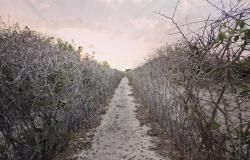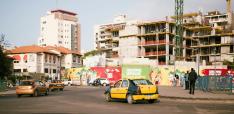A Critical Analysis of the War and the Triple Nexus in Northern Mozambique

This is a chapter in a forthcoming e-book, entitled 'The Triple Humanitarian, Development and Peace Nexus: In Context and Everyday Perspective', edited by Marina Ferrero Baselga and Rodrigo Mena. Chapters are currently being serialised on Global Policy.
The armed conflict in Cabo Delgado
Since October 2017, armed clashes have been raging in the north-eastern part of Cabo Delgado province (northern Mozambique) between local Islamist insurgents (Al Sunnah wa Jama-ASWJ) and the Mozambican army. Faced with the escalation of the war and the massive increase in displacement, the Government turned to Rwanda and the Southern African Development Community (SADC) for international support to organise anti-terrorist military missions, which have been financed by the EU and the US. Rather than responding to the vital needs of the populations affected by the war, these military operations are serving to protect the gas extraction sites of TotalEnergies and ExxonMobil.
Since 2017, there have been around 6,000 deaths, and since 2019, humanitarian operations have been trying to meet the food and basic needs of more than 1.5 million people, including internally displaced persons and those affected by successive cyclones in northern Mozambique. Although the insurgency has been reduced to around 300 fighters, and by 2024 almost half of the population had returned home, rebel attacks continue. The situation for communities returning to hotspots remains very precarious.
The humanitarian operations are extremely expensive but rarely self-critical. Corruption allegations have emerged over the distribution of food vouchers and food baskets. There has also been little planning for the resettlement of displaced people, and few initiatives to support livelihoods and income generation. As a result, many families remain dependent on aid. Given the chronic nature of humanitarian operations, insufficient measures are being taken to end the complacency and dependence on aid of many families. Local solidarity mechanisms—which have largely covered most of the emergencies caused by displacement—continue to be underestimated.
At the same time, the Mozambican government has begun planning the reconstruction of the northern provinces even though the armed conflict has not yet ended. In 2020, it created the Agency for the Integrated Development of the North (ADIN) with its PREDIN programme for the period 2022-2027 with a budget of 2.5 billion dollars, with the financing and collaboration of the main international financial institutions and the United Nations.
There is no consensus on the diagnosis of the armed conflict or the solutions for peace. Some see it as foreign aggression with strong links to the Islamic State. Local actors, particularly young people, point to historical injustices, growing poverty and lack of government investment, along with unfulfilled promises of mega-projects. Still others focus on the broader geopolitical struggle over natural resources and the advance of the extractive frontier.
It should not be forgotten that Cabo Delgado is a territory characterized by slow violence: the war of independence (1966-1974), the 16-year war between Frelimo and Renamo (1977-1992) and its resurgence (2012-2019), the armed confrontation between the Islamist insurgency and the Mozambican and Rwandan armies that began in 2017, and the recent national political instability following accusations of fraud by the opposition after the presidential elections of 2024.
The triple nexus in northern Mozambique
This section reviews the triple nexus initiatives being implemented in Cabo Delgado, emphasising the importance of including critical perspectives aimed at improving humanitarian, development and peace interventions in complex emergency contexts related to armed conflict.
The triple nexus encompasses different ways of doing things. The question that needs to be asked is whether the triple nexus approach is being implemented. In Cabo Delgado, there is no single proposal or approach. To simplify, we could talk about three different ways of understanding the triple nexus:
A triple nexus approach based on the securitisation of aid, or militarised peace. Here, the decision-makers are the Mozambican government, its partner countries (Rwanda, France, the European Union and the United States) and large investment companies. The future of Cabo Delgado lies in the hands of the military intelligence of these governments and the boards of directors of these multinational companies. Military solutions dominate, with hundreds of millions of dollars spent on counterinsurgency rather than peace negotiations, state-building, or human security. Protecting mega-projects takes priority over protecting people.
A liberal triple nexus approach ‘under construction’. Promoted by the UN, this approach seeks to advance Humanitarian, Development, Peace (HDP) actions, and focuses on coordination, technical solutions, and the localisation of aid — in theory. In practice, it often misses local realities.
There are several noteworthy initiatives, such as the Peace Programme and the UN cooperation framework with the Government of Mozambique, the IOM's Triple Nexus Roadmap (2022-2026), the German cooperation agency (GIZ) and the UNHCR's Nexus North II programme, and other research initiatives and programmes by national and international non-governmental institutions (MASC, IESE, CDD, AVSI, etc.). The aim is to improve communication and coordination between the Mozambican authorities and international cooperation agencies, with projects to improve the economic capacities of displaced persons, initiatives to prevent jihadism and community cohesion programmes to promote peaceful coexistence between displaced and host populations.
This official approach, which is being developed in humanitarian clusters in collaboration with ADIN and its reconstruction and development agenda, has begun to influence peace programmes in Mozambique. But despite these efforts, this approach remains subordinate to the militarised agenda because it does not push for direct negotiations with insurgents or fundamental political reforms.
A more emancipatory Triple Nexus. Apart from these (neo) liberal and colonial approaches to security, development and international cooperation, it is not easy to propose alternatives. One is to start from the premise that the subjects of HDP are communities and not the cooperation industry, and from the necessary reconfiguration of relations in favour of the sectors and groups with the least power and decision-making capacity.
This is not only about shifting interventions to the local or community level or integrating peace into humanitarian and development efforts. It also requires dismantling cultural hierarchies and unexamined privileges, approaching local resistances with humility and openness. We need to foster genuine, horizontal dialogue between marginalised and privileged actors, valuing the lessons learned from grassroots organisations and transcending our institutionalised ways of acting.
Through participatory research, we have identified potential for advancing peace in Cabo Delgado in the cultural knowledge and heritage of the Makua, Makonde and Mwuanie peoples:
Local conflict resolution: Beyond local mechanisms for resolving intra- and inter-community conflicts related to coexistence and daily life, there are traditional, religious and grassroots leaders with the capacity to negotiate with the insurgency and advance towards ending the war.
Solidarity networks: While armed actors exploit ethnic and religious differences to create social divisions where none existed, it is necessary to promote the importance of lineages and their sense of belonging for intergroup dialogue and to reactivate mechanisms of solidarity and social cohesion.
Restorative justice: More attention must be paid to the work of memory, truth, and justice, drawing on existing capacities. There are restorative, less punitive practices based on alternative conflict resolution mechanisms and other strategies of social shame, irony, and persuasion that can contribute to healing the wounds of the violence generated by this war and previous ones.
Collective rituals: There are collective rituals such as ‘sit-ins’ (sentadas) that address conflicts of different kinds, where the actors sit down to untangle the knots and ensure that nothing is left unsaid, thereby restoring trust and respect. It is unwise to create Peace Committees from outside when there are already mechanisms in place.
Women’s agency: It must be ensured that women in Cabo Delgado are at the centre of humanitarian, development and peace decisions Imposing a Women, Peace and Security Agenda based on liberal Gender Development Strategies (GDS) and a ‘militarised’ Triple Nexus does not make much sense for the women of Cabo Delgado. The concepts of gender equality and violence, development and peace cannot be understood without context.
We must start from the concrete and culturally contextualised living conditions and power relations. In addition to sexual abuse and violence and forced marriages, there are other forms of violence such as sex in exchange for food, or abandonment by husbands because of issues related to lineage and community status that require greater attention.
To advance women's collective agency and decision-making capacity, we must not lose sight of existing spaces and institutions, such as kitchens, women's sit-ins, xitikis or savings and credit groups, women dreamers or ‘sograrias’ who advise on issues related to sexuality, motherhood and everyday family matters.
To address these and other issues, we must rely on the collective agency of women and consider existing local spaces and institutions. We must not lose sight of the kitchens, the sentadas of women, the xitikis or savings and credit groups, and the women dreamers and ‘sograrias’ who advise on issues related to sexuality, motherhood and everyday family matters.
A critical view of the triple nexus
Without idealising them, we must believe in local collective capacities, open spaces for deliberation within communities and between communities and other actors to end direct violence, enable the dignified return of displaced communities and rethink a peaceful future for Cabo Delgado.
The purpose of the Triple Nexus should not focus so much on the effectiveness and improvement of the actions of cooperation actors, but rather on strengthening local agency in HDP, from feminist and decolonial approaches. The important thing is that humanitarian, development and peace actions are at the service of what local communities and actors propose, if they seek to improve lives and advance social justice and peaceful coexistence.
Westernised approaches to the triple nexus that are constructed in large forums and world capitals are not useful, as they are “top-down” proposals which, while they may partially alleviate humanitarian disasters, ignore local knowledge and proposals and generate dependencies, perpetuating vulnerabilities in communities.
We need to move forward with critical, localised and feminist visions of the Triple Nexus that leave behind imperialist, neo-extractivist and civilisational approaches. Liberal securitised/militarised approaches are not capable of ending the armed conflict in Cabo Delgado, so we must ‘make peaces’ considering collective agency and local cultural heritage.
Jokin Alberdi Bidaguren: President of Gernika Gogoratuz Association. PhD in Political Science from the EHU / UPV and professor of Constitutional Law and European Union’s Law at the same university. Responsible for the international research project “Territories in conflict: Research, training and action for the strengthening of capacities and the construction of life alternatives”, Cabo Delgado (Mozambique), Tolima (Colombia) and Urdaibai (Euskal Herria). He is a member of the Research Group of HEGOA (UPV / EHU) and collaborates with the African Studies Group of Madrid´s Autonomous University.
Teresa Cunha: Doctor in Sociology at the University of Coímbra. Senior Investigator in the Center of Social Studies of Coímbra where she gives lessons in various PhD courses. Co-coordination in the publication Taller del CES, Los Ciclos del Taller de Genero, coordination of the winter school “Ecologías Feministas del Conocimiento” and of the investigation programme Epistemology of the south. She is associate professor at the “Escuela Superior de Educación del Instituto Politécnico Superior de Coímbra” and associate investigator in CODESRIA and the Center or African Studies at the University Eduardo Mondlane, Mozambique. In 2017 she was bestowed the medal of Timor-Leste by the president of the Democratic Republic of Timor-Leste.
Alberto Ernesto: Researcher at the Centro de Estudos e Acção para a Paz (CEAP) in Cabo Delgado and staff member of Ayuda en Acción Mozambique. He has co-researched several social studies carried out by CEAP on issues contributing to the sustainable development of Cabo Delgado province, particularly in the fields of politics, governance, and socio-economic dynamics. In addition, he serves as Administrator and Manager of CEAP’s financial and asset resources. Alberto is also an experienced facilitator of short courses on Ethics and Professional Deontology as well as Human Rights.
Photo by Almeida de Almeida:


